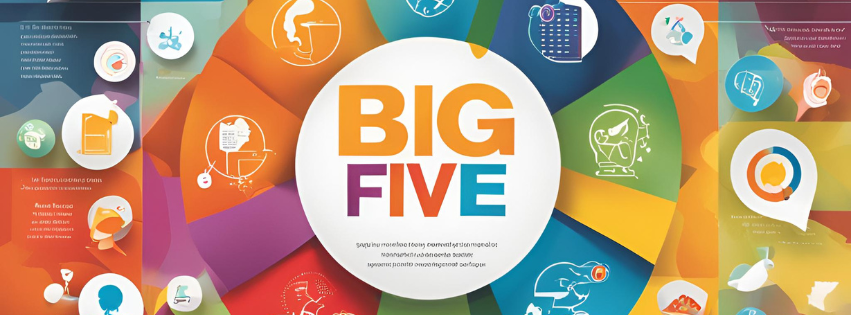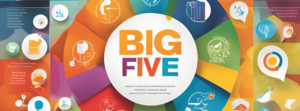
Understanding the characteristics and values of Generation Z is crucial for employers. Adapting management and the work environment to meet their needs is key. Carpenter et al. (2009) proposed that personality traits and values significantly shape individual behavior and attitude at work. They believe personality can shift due to life experiences, leading to unstable changes (Carpenter et al., 2010).
The Big Five Personality Traits
The ‘Five Big Personality Traits’ include openness, conscientiousness, extraversion, agreeableness, and neuroticism. Leaders can use these traits to guide how they approach employee behavior, as job performance often depends on them. For instance, conscientious individuals may aim for perfection by controlling every detail. In contrast, those high in extraversion thrive on social interaction, making them ideal for sales or client relations roles.
Additional Traits: Self-Efficacy, Self-Esteem, and Proactive Personality
Carpenter et al. (2010) explored additional traits such as self-efficacy, self-esteem, and proactive personality. They found that job performance, satisfaction, and career success often depend on these traits. For example, high self-efficacy correlates with better performance, while proactive individuals take initiative, positively influencing workplace dynamics. Although personality traits impact job attitudes, cognitive ability may be a better predictor of success (Carpenter et al., 2010; Goldberg, 1990).
The Importance of Values in the Workplace
Values, like personality traits, provide stability and play a key role in job satisfaction and career choices. People are more likely to stay in jobs that align with their values—whether stimulation, achievement, or benevolence. These values influence how employees react to job characteristics and organizational changes.
Applying Personality Theory to Generation Z
An important question is whether Carpenter et al.’s theory applies to Generation Z employees born from 1997 onward. Choughari (2024) theorized that personality traits apply to Generation Z, but organizations need to adjust to their unique characteristics and values. This adaptation is essential because it shapes the workplace and the role of Gen Z workers, emphasizing flexibility, innovation, purpose, and social impact.
Adapting to Gen Z’s Needs in the Workplace
Employers play a key role in creating an environment that aligns with Gen Z’s values. For example, companies could involve flexible work hours, fostering innovation, and aligning the company’s mission with social impact. Gen Z’s personality traits differ from previous generations, especially since they grew up in a digitally connected world (Choughari, 2024). They embrace openness, particularly in technology and social progress. Therefore, they are adaptable but demand flexible and innovative workplaces to maintain engagement. Their extraversion is often expressed through virtual interactions rather than face-to-face. Gen Z’s awareness of mental health may require employers to provide strong support systems, especially for those scoring high in neuroticism (Dauvier et al., 2019).
The Values of Generation Z
Generation Z values authenticity, diversity, and social impact. They seek employers who align with their views on equality and sustainability. This generation also values flexibility and work-life balance, which can challenge traditional organizational structures. Value alignment is crucial for job satisfaction and long-term retention. Businesses may need to adjust their missions and value propositions to attract and retain Gen Z talent.
The Relevance of Proactive Personality
The concept of proactive personality proposed by Carpenter et al. (2010) is highly relevant to Gen Z. They are proactive, especially in advocating for environmental issues and workplace equality. Organizations must balance Gen Z’s desire for immediate change with broader strategic goals (Goldberg, 1990).
Key Takeaways for Employers
This article helps employers embrace new strategies for maintaining the satisfaction and productivity of Generation Z. Following Carpenter, Bauer, and Erdogan’s (2010) theory, companies can apply the following key points to hiring and increasing Gen Z productivity:
- Generation Z’s digital upbringing has altered their personality traits. They are open to technology and societal advancement. To keep them engaged, employers must be flexible and imaginative (Lazar et al., 2023).
- Employers need to offer strong support systems for Gen Z employees, particularly those high in neuroticism. Mental health awareness is crucial, and Gen Z expects companies to be responsive to these needs.
- Although diligent, Generation Z values independence and purpose over conventional success markers like job security. Their extraversion often shows through online interactions (Dauvier et al., 2019). Providing a supportive and secure environment is key to making them feel valued.
- Gen Z prioritizes authenticity, diversity, and social impact, as well as work-life balance. Companies must adjust their organizational structures to attract and retain this talent (Whitehorn, 2024). Employers must not only attract Gen Z but also make them feel like they belong and are contributing to something meaningful.
- In their advocacy for environmental and workplace reforms, Gen Z’s proactive personality aligns with Carpenter et al.’s (2010) theory. Organizations must balance short-term needs with long-term objectives (Goldberg, 1990).
- Gen Z prefers transparent hiring processes and abilities-based assessments rather than traditional personality tests. As such, Carpenter, Bauer, and Erdogan’s theory may need to be adjusted, as Gen Z sees personality as fluid and responsive to social and technological changes (Carpenter et al., 2010; Goldberg, 1990).
References:
Carpenter, M., Bauer, T., & Erdogan, B. (2010). Management principles, v. 1.1. https://2012books.lardbucket.org/books/management-principles-v1.1/index.html
Choughari, H. (2024, August 13). Council post: The impact of gen-z in the Workplace. Forbes. https://www.forbes.com/councils/forbeshumanresourcescouncil/2024/02/05/the-impact-of-gen-z-in-the-workplace/
Dauvier, B., Pavani, J.-B., Le Vigouroux, S., Kop, J.-L., & Congard, A. (2019). The interactive effect of neuroticism and extraversion on the daily variability of Affective States. Journal of Research in Personality, 78, p. 1–15. https://doi.org/10.1016/j.jrp.2018.10.007
Goldberg, L. R. (1990). An Alternative “Description of Personality”: The Big-Five Factor Structure. Journal of Personality and Social Psychology, 59, p. 1216-1229. https://doi.org/10.1037/0022-3514.59.6.1216
Lazar, M.-A., Zbuchea, A., & Pînzaru, F. (2023). The emerging generation Z workforce in the Digital World: A literature review on cooperation and transformation. Proceedings of the International Conference on Business Excellence, 17(1), 1991–2001. https://doi.org/10.2478/picbe-2023-0175
Whitehorn, B. (2024, June 6). Generation Z is revolutionizing the workplace. CLSR. https://www.clsr.ca/generationz/






